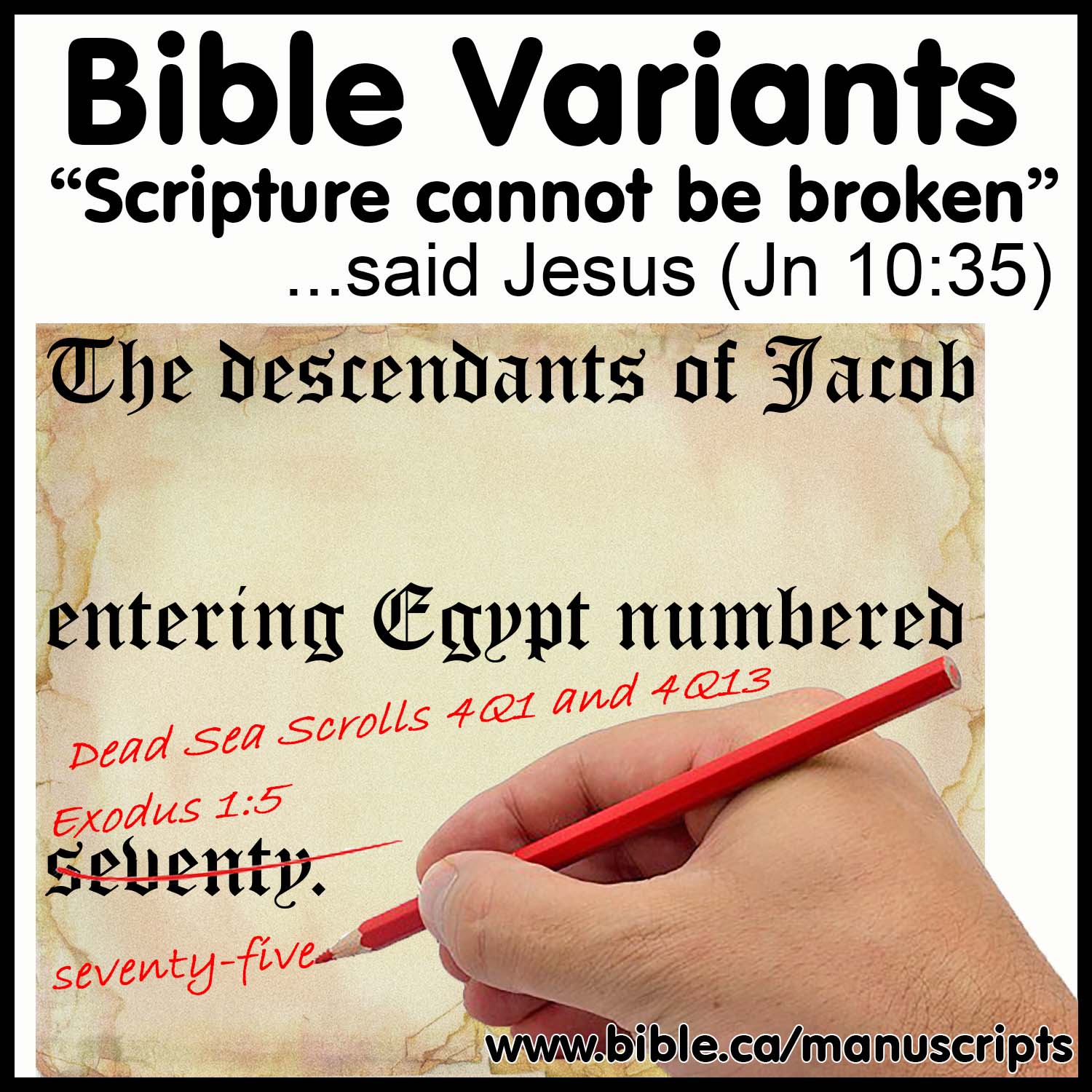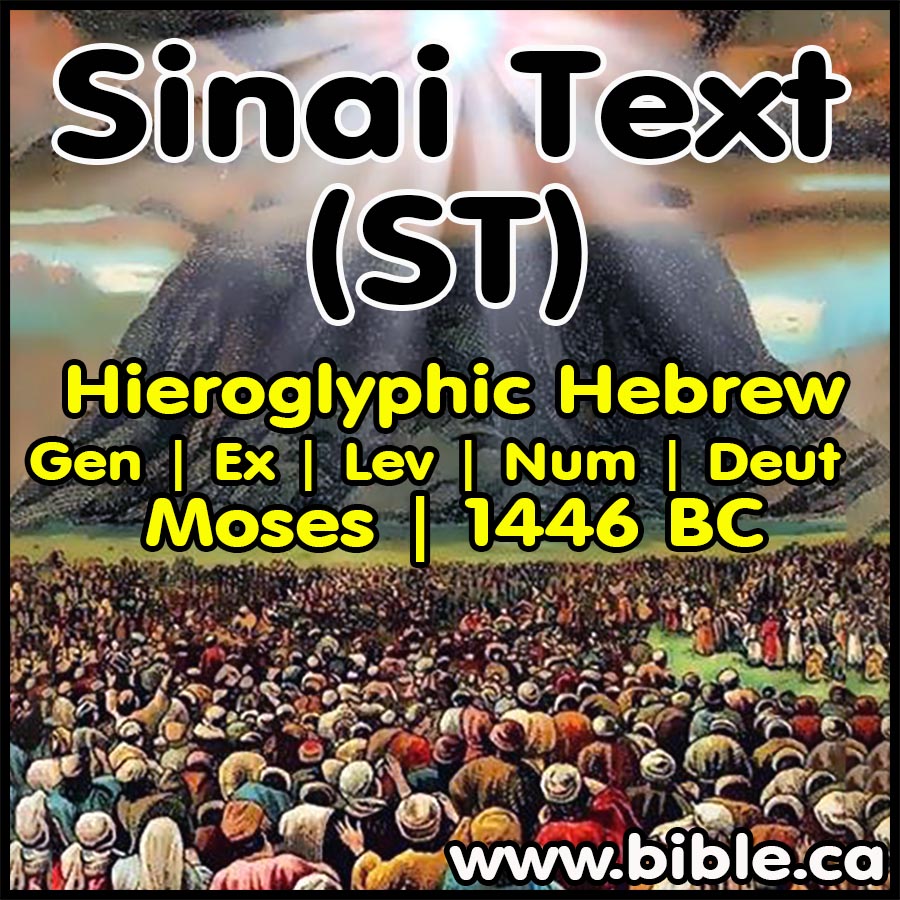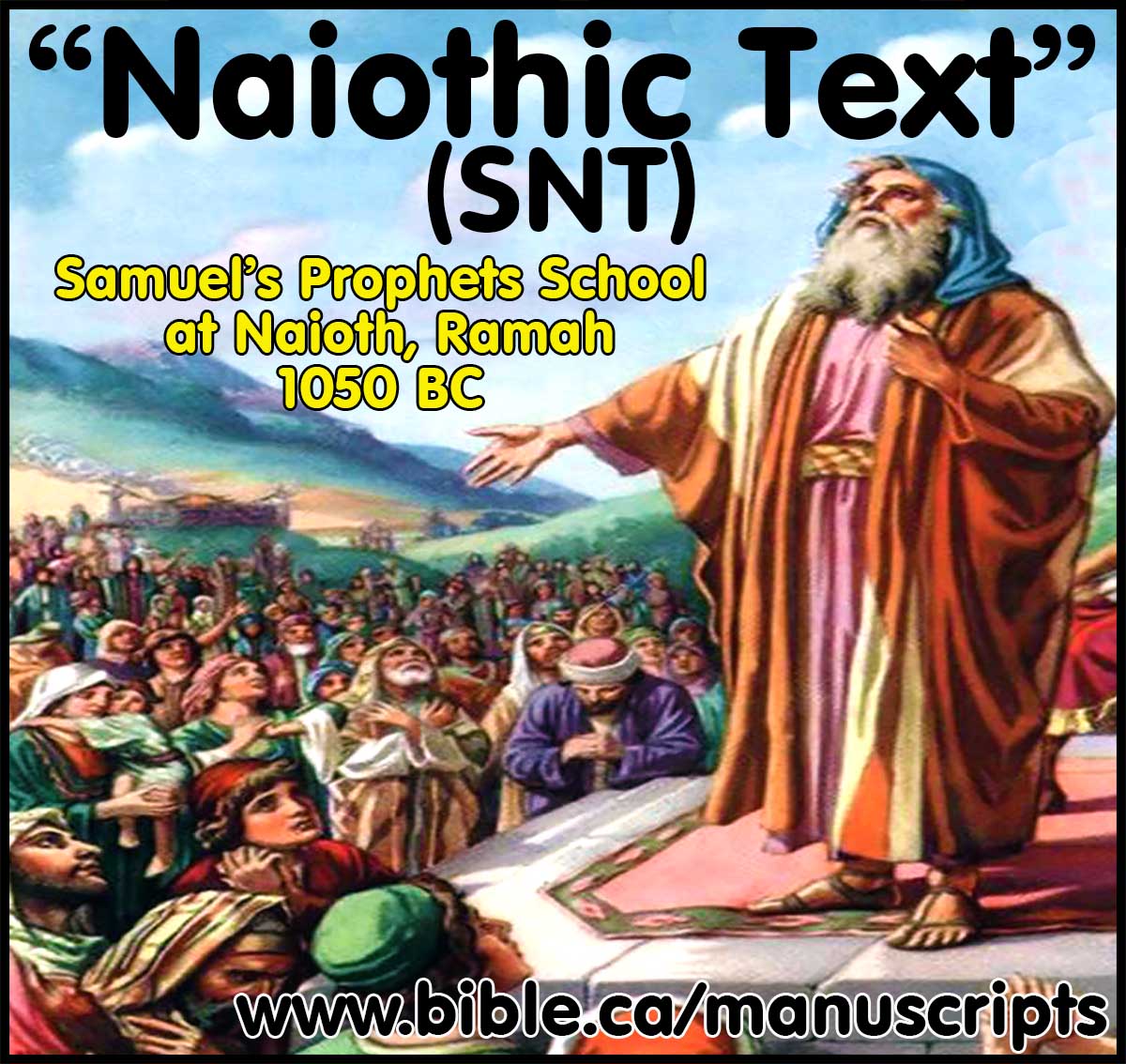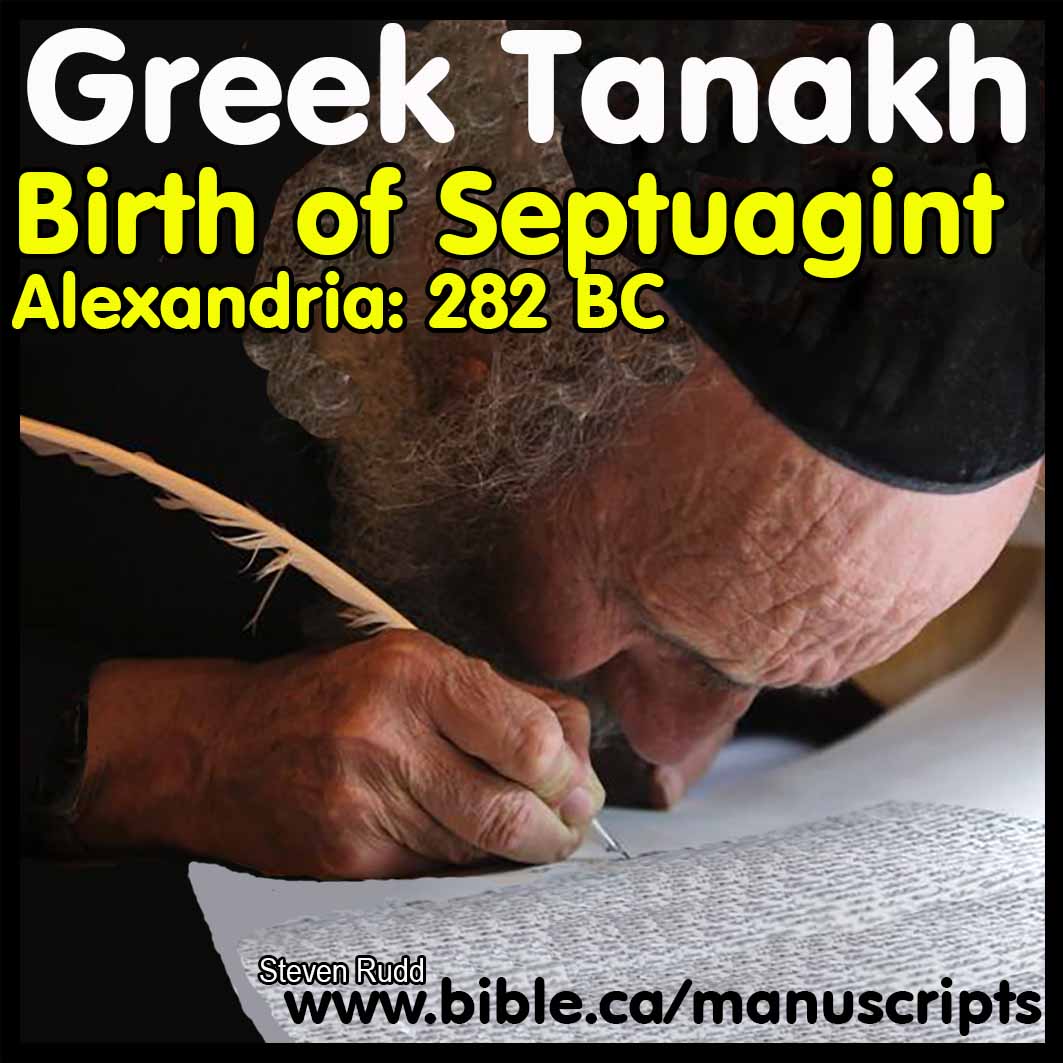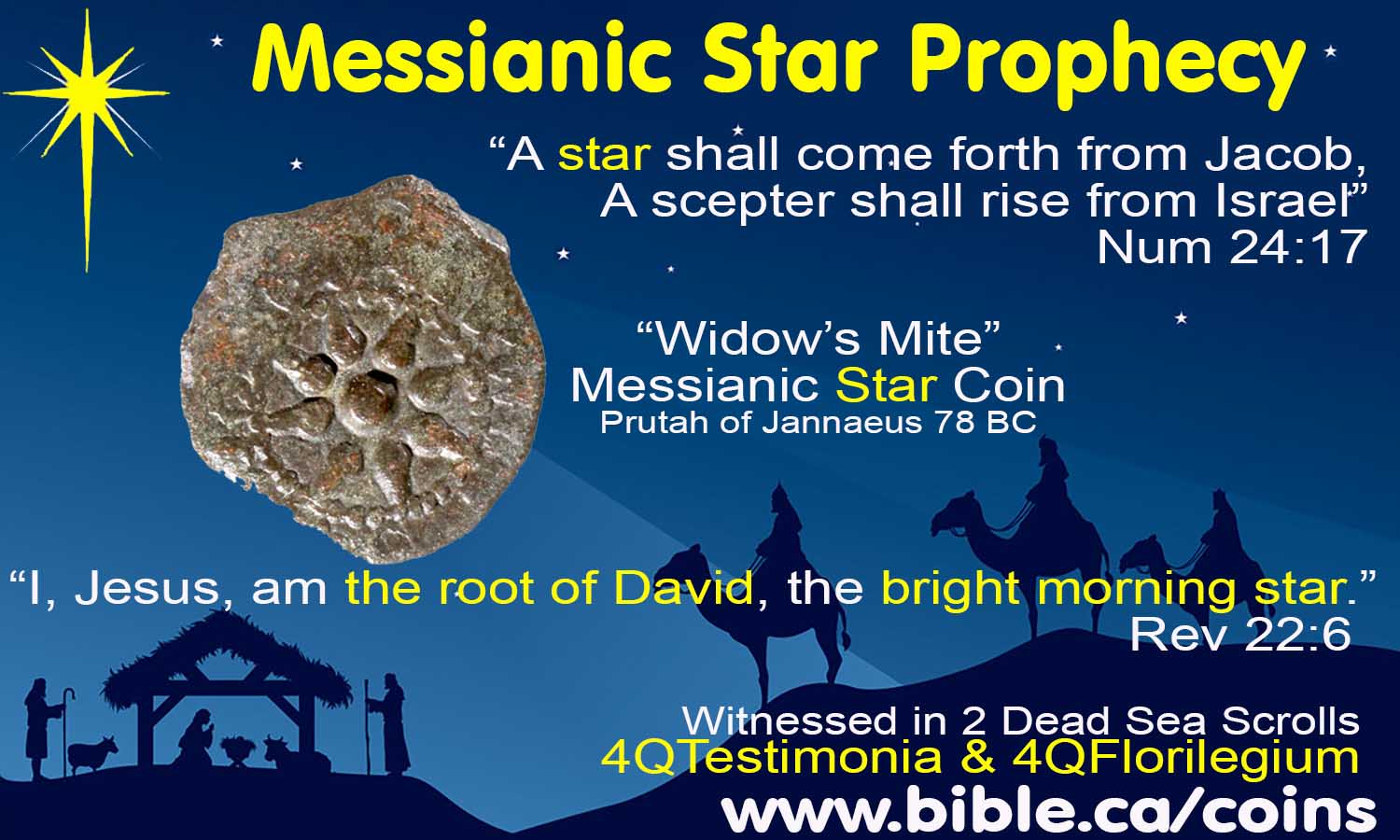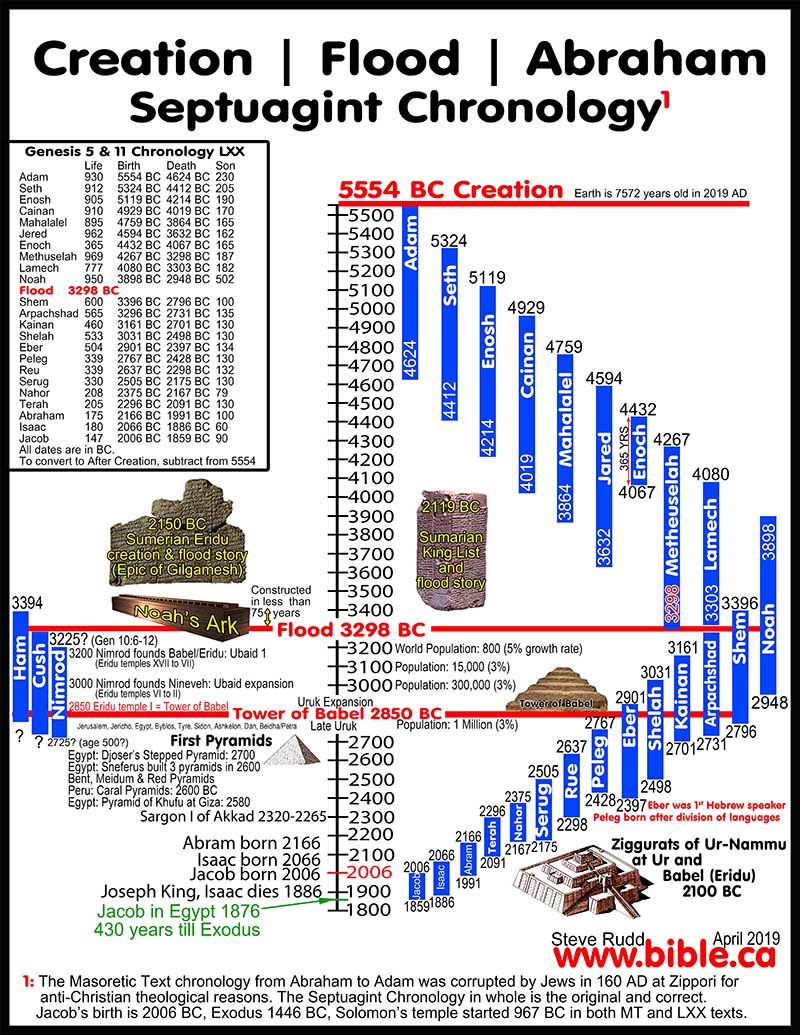|
Inverted Birth order of Shem and Japheth (Shem was second born when Noah was 502 years old) Chronological Interpretation Variants in the Bible "Scripture cannot be broken" (Jesus, John 10:35) "My word will accomplish what I desire and succeed in the purpose for which I sent it." (Isa 55:11) Steve Rudd November 2017 |
Birth order of Shem and Japheth: Shem was second born when Noah was 502 years old
Anti-Christian, Chronological Interpretation Variants in the Book of Genesis
Bible textual variants analysed
Introduction:
The backdrop to the birth order of Shem is that in the Seder Olam Rabbah 160 AD, Jews started equating Shem with Melchizedek for the first time in Jewish History, to counter the Christian doctrine that Christ was the type of Melchizedek as seen in the book of Hebrews. It was important to the Jews who just suffered their second major defeat in the second Jewish war of 135 AD that Shem as Melchizedek, conferred priesthood to Abraham. But it was all a fiction created by the Jews in living in Zippori in 160 AD as an anti-Christian revision to counter the idea that Jesus was the messianic type of Melchizedek in the book of Hebrews. The earliest Jewish literary sources (100 BC) make no connection of Shem was Melchizedek as witnessed in the Dead Sea Scrolls: 1QGenesis Apocryphon. At the time of Christ, Jewish messianic expectation was of the arrival of Melchizedek as a “heavenly being” not Shem as witnessed in the Dead Sea Scrolls dating to 90 BC in 11QMelchizedek. The earliest literary source that equates Melchizedek with Shem is Seder Olam Rabbah in 160 AD, then in Targum Onqelos in 225 AD. The Bible clearly teaches in all versions, both Greek Septuagint and Hebrew Masoretic, that Shem was second born of when Noah was 502 years old. The confusion over determining who was the older brother between Shem and Japheth is caused by a minor variant in the Hebrew manuscripts in 160 AD. In Gen 10:21 the LXX indicates Shem was younger than Japheth but the Hebrew wording in the Masoretic makes it uncertain who is older. Some English translators wrongly make Shem the oldest. This minor variant in Hebrew wording is exactly what the Jews wanted to achieve in their anti-Christian revisions of their Hebrew Bible in 160 AD. The Greek LXX calls Japheth “the great” which meant he is both older than Shem or that he was more famous, powerful or richer than Shem. This was simply impossible for the Jews in 160 AD to allow if they wanted to start, for the first time in history, make Shem the GREAT Melchizedek. The Jews wanted to counter the Christian doctrine in the book of Hebrews that Jesus has the priesthood of Melchizedek as the Messianic king/priest/conqueror:
"The Lord has sworn and will not change His mind, “You are a priest forever According to the order of Melchizedek.” The Lord is at Your right hand; He will shatter kings in the day of His wrath. He will judge among the nations, He will fill them with corpses, He will shatter the chief men over a broad country. He will drink from the brook by the wayside; Therefore He will lift up His head." (Psalm 110:4–7)
See full outline: Shem WAS NOT Melchizedek
Discussion:
I. Faulty interpretation caused by a deliberate underlying manuscript textual variance in the Hebrew Text:
1. The variance in English translations between the MT and the LXX is at the translation level due to a difference in underlying texts.
a. Japheth was firstborn when Noah was 500, Shem second-born when Noah was 502 and Ham the youngest. We know for certain that Shem was not firstborn as per Gen 11:10 and that Ham was the youngest as per Gen 9:24 which obviously makes Japheth the oldest.
b. While Genesis 5:32 says Noah was 500 years old when Shem, Ham, and Japheth were born, we learn from Gen 11:10 that Shem was 100 years old in the second year after the flood when Arpachshad was born. This proves to us that Shem was not born till Noah was 502 years old and younger than Japheth.
2. The fact that Gen 5:32 lists Shem first follows succession not birth order:
|
THE STOLEN BLESSING: Jacob and Esau The theme of the rejected blessing of the firstborn given to the second-born Read outline
Ten people who had their blessing stolen: Able, Shem, Abram, Isaac, Jacob, Joseph, Perez, Rachel, Shimri, Christians |
a. Shem is listed first not because he was firstborn, but because he is in the line of Jesus Christ.
b. There is a pattern in the Bible of the blessing being given to the second born AND the second born is named first.
c. For example, Esau was older than Jacob, but it was Jacob to got the succession blessing AND he is named first in three places: Genesis 28:5; Joshua 24:4; Hebrews 11:20.
d. Only once, at the funeral of Isaac, did the order harmonize with birth order: “Esau and Jacob” in Genesis 35:29. Also note that Esau and Jacob buried Isaac in 1886 BC, the year Joseph became king of Egypt and the first year of the seven years of plenty. Jacob moves to Egypt in year 3 of the famine in 1876 BC, (10th year of Joseph’s reign as king)
e. “The birth order is not given in Genesis 5:32 (Shem, Ham, Japheth). Shem is listed first because he is in the Messianic line. The same goes for Abraham in Gen 11:26, who was not born when Terah was 70, but 130. This repetition creates a literary inclusio between 5:32 and 11:26 in the primeval history. Moses is making a theological point in both verses, while also giving a chronological referent. The son who was born in the 500th year of Noah’s life is Japheth. Shem is born when Noah is 502, and Ham is the youngest (the superlative translation of “youngest” in 9:24, הַקָּטָ, is almost certainly correct). In Gen 11:26, the genitive τοῦ μείζονος makes Japheth the elder brother of Shem. This is also the Masoretes’ understanding of the Hebrew, as the accentuation shows.” (Henry Smith, Oct. 2017)
3. In Gen 10:21 English translators are split on which of Shem and Japheth were the oldest. The Hebrew in the MT and SP could mean either that Japheth or Shem were the older brother. The Greek LXX calls Japheth “the great” which may mean he is older than Shem or that he was older and/or more famous than Shem. This confusion today is exactly what the Jews in 160 AD calculated to occur by casting doubt, making things unclear and allowing them to equate Shem with Melchizedek. See full outline: Shem WAS NOT Melchizedek
II. Key Bible texts:
1. "Also to Shem, the father of all the children of Eber, and the older brother of Japheth, children were born." (Genesis 10:21, MT)
2. "And to Shem were born children, even to him, the father of all the sons of Eber, the brother of Japheth the great." (Genesis 10:21, LXX)
3. "Noah was five hundred years old, and Noah became the father of Shem, Ham, and Japheth." (Genesis 5:32, MT, LXX)
4. "These are the records of the generations of Shem. Shem was one hundred years old, and became the father of Arpachshad two years after the flood;" (Genesis 11:10, MT, LXX)
5. "When Noah awoke from his wine, he knew what his youngest son [Ham] had done to him." (Genesis 9:24)
III. Literary sources that got it wrong with Shem as firstborn:
1. 170 BC: The Book of Jubilees has Shem as firstborn:
a. The book of Jubilees dates to 150 BC and is a corrupt chronology that fits world history into periods of 49 years. Jubilees makes Shem the first born at Noah’s age of 500:
b. “ And the healing of all their illnesses together with their seductions we told Noah so that he might heal by means of herbs of the earth. 13 And Noah wrote everything in a book just as we taught him according to every kind of healing. And the evil spirits were restrained from following the sons of Noah. 14 And he gave everything which he wrote to Shem, his oldest son, because he loved him much more than all of his sons.” (Book of Jubilees 10.12–14)
2. 160 AD: Seder Olam implies the Shem is the oldest and “greatest” since he is equated with Melchizedek:
a. “About Shem it says (Gen. 9:26): "Praised be the Eternal, the God of Shem," (Ps. 110:4) "about my word to Malchisedekio [Melchizedek]."” (Seder Olam Rabbah 21:77, 160 AD)
3. 400 AD: Augustine believed Shem was firstborn:
a. Augustine says the “scripture” states Shem is firstborn, Ham second born and Japheth is youngest. This actually violates two Bible passages and leaves us scratching our heads as to what Augustine was smoking that day! It is actually quite shocking for Augustine to make such a basic fundamental error:
b. “Noe blessed his oldest and youngest sons: ‘Blessed be the Lord God of Shem, be Chanaan his servant. May God enlarge Japheth, and may he dwell in the tents of Shem.” (Augustine, Aug., De civ. Dei 16.1, 400 AD)
c. “Ham (meaning ‘hot’) was Noe’s middle son, in between the others yet apart from each of them—neither in the ‘first fruits’ of the Israelites nor in the ‘fulness of the Gentiles.” (Augustine, Aug., De civ. Dei 16.2, 400 AD)
d. “Assur (from whom the Assyrians take their name) was not among the sons of Ham, the middle son of Noe, but among the sons of Shem, the oldest son of Noe. Thus it is clear that those who later gained the kingdom of the giant and from there proceeded to build other cities (like Nineve, built by Ninus) were descendants of Shem.” (Augustine, Aug., De civ. Dei 16.3, 400 AD)
e. “The first mention of the descendants begins with the youngest son, whose name was Japheth.” (Augustine, Aug., De civ. Dei 16.3, 400 AD)
f. “And now we turn to the sons of Shem, the eldest son of Noe. The narrative of Noe’s descendants which began with the youngest son finally reaches Sem.” (Augustine, Aug., De civ. Dei 16.3, 400 AD)
IV. Literary sources that got it correct with Shem as second born:
1. In 30 AD Philo followed the LXX: “Why was it that Noah lived after the deluge three hundred and fifty years? (Genesis 9:28). It is now declared that in two periods of seven years the form of the world was originally created and now renewed under Noah. But the wise man lives for a period of fourteen quarters of a century; and fourteen times twenty-five is equal to seven times fifty, or fifty times seven. And it is the principle of the seventh year and also of the fiftieth, which has an especial order of its own explained and ordained in Leviticus. (79) Why among the three sons of Noah does Ham appear always to occupy the middle place, but the two extremities are varied; for when their birth is mentioned, Shem is placed in the first rank, in this manner, Shem, Ham, and Japhet; but when they are spoken of as fathers, then Japhet is mentioned first, and the beginning of the enumeration of the nations is derived from Japhet himself? (Genesis 10:1). Those who inquire into the literal nature of the divine writings think thus of the order in which these men are mentioned, looking upon him who is the first named, that is Shem, as the younger; and upon him who is named the last, that is Japhet, as the elder. However they may choose to think of this let them, being guided by the principle of mere opinion. But we who look to the real meaning of these statements think that there is here a reference to the three things, good, bad, and indifferent; which last are called secondary goods; and we must therefore think that the sacred writer always puts the bad in the middle, so that being confined at either extremity it may be subdued on one side by the one, and on the other side by the other; so that, being confined, it may be kept in and subdued.” (Philo QG II 78–79, 30 AD)
Conclusion:
1. See full outline: Shem WAS NOT Melchizedek
2. The Septuagint preserves the original reading that Japheth was firstborn, older and/or greater.
3. The confusion over Shem being the “older” and “greater” roots in the 160 AD Jewish anti-Christian redefining of Shem as the same person as Melchizedek.
a. The Jews altered the wording in such a slight way so as to deliberately make “older” or “Greater” refer to either Shem or Japheth.
b. This allowed them to equate Shem with the Great Melchizedek who conferred his “priesthood” on Abraham.
c. The confusion today between the LXX and MT is exactly what the Jews in 160 AD calculated to occur by casting doubt, making things unclear and allowing them to equate Shem with Melchizedek.
d. It counters the Christian doctrine in the book of Hebrews that Jesus has the priesthood of Melchizedek as the Messianic king/priest/conqueror:
i. "The Lord has sworn and will not change His mind, “You are a priest forever According to the order of Melchizedek.” The Lord is at Your right hand; He will shatter kings in the day of His wrath. He will judge among the nations, He will fill them with corpses, He will shatter the chief men over a broad country. He will drink from the brook by the wayside; Therefore He will lift up His head." (Psalm 110:4–7)
4. It is actually quite shocking that so many of the ancients could not figure out this grade school problem of who was firstborn between Shem and Japheth.
a. Apparently, the overriding need for succession of the Firstborn and the blessings that followed, required the ancients to ignore clear Bible passages to the contrary.
b. Christians know that there is a long pattern in the Bible of the second-born getting succession rights and blessings from Jacob down to Christians, who are second-born to Christ the true AND ONLY FIRSTBORN
|
THE STOLEN BLESSING: Jacob and Esau The theme of the rejected blessing of the firstborn given to the second-born Read outline
Ten people who had their blessing stolen: Able, Shem, Abram, Isaac, Jacob, Joseph, Perez, Rachel, Shimri, Christians |
In the final analysis, we can be certain that we possess the word of God!
This is what Jesus meant, when He said: "Scripture cannot be broken" (Jesus, John 10:35)
"My word will accomplish what I desire and succeed in the purpose for which I sent it." (Isa 55:11)
|
The Septuagint LXX “Scripture Cannot Be Broken” |
|||||
|
Start Here: Master Introduction and Index |
|||||
|
Six Bible Manuscripts |
|||||
|
1446 BC Sinai Text (ST) |
1050 BC Samuel’s Text (SNT) |
623 BC Samaritan (SP) |
458 BC Ezra’s Text (XIV) |
282 BC Septuagint (LXX) |
160 AD Masoretic (MT) |
|
Research Tools |
|||||
|
Steve Rudd, November 2017 AD: Contact the author for comments, input or corrections |
|||||
By Steve Rudd: November 2017: Contact the author for comments, input or corrections.
Go to: Main Bible Manuscripts Page
Go to: Main Ancient Synagogue Start Page
